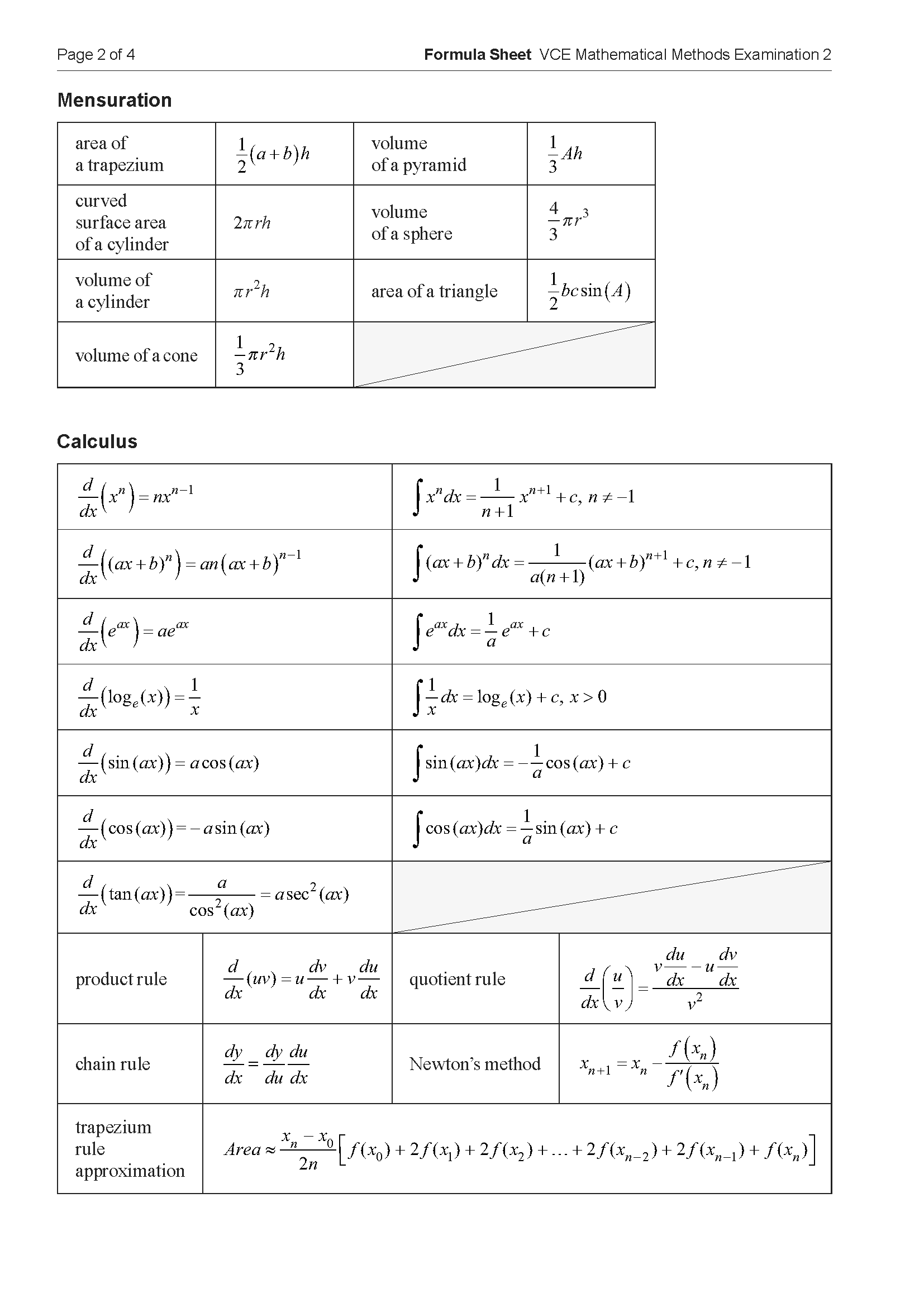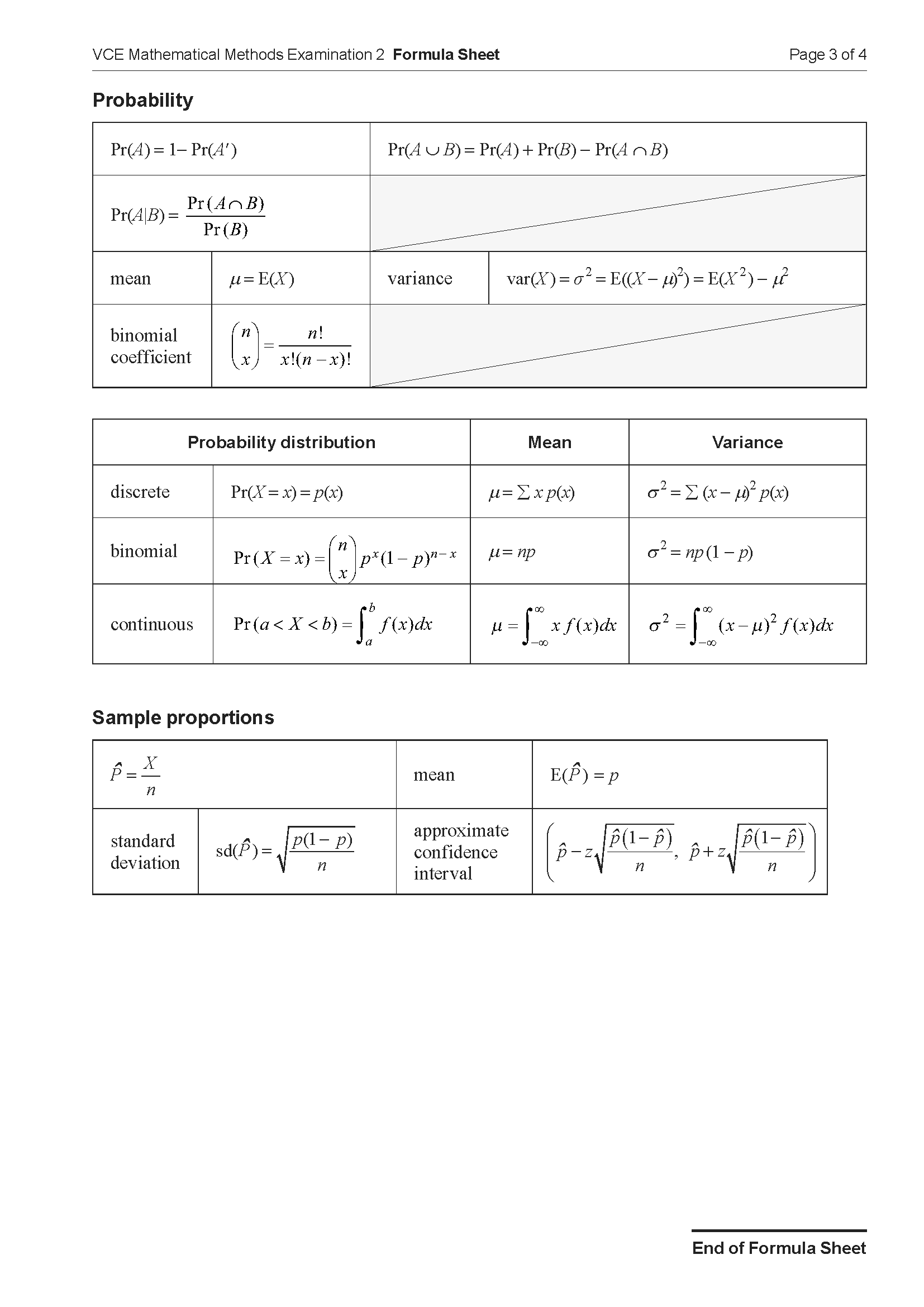This is both 2024 Maths Methods Exams (Exam 1 & 2) split into ten 30-minute tests.
Select the test you would like to do today! If you have any suggestions or find an error, click here to send me a message (Alex)
Exam 1 Tests ->
Exam 2 Tests ->
MathsMethods.com.au
2024 VCAA Math Methods Exam 2: Test 1
Number of marks: 16
Reading time: 3 minutes
Writing time: 24 minutes
Section A – Multiple-choice questions
Instructions
• Answer all questions in pencil on your Multiple-Choice Answer Sheet.
• Choose the response that is correct for the question.
• A correct answer scores 1; an incorrect answer scores 0.
• Marks will not be deducted for incorrect answers.
• No marks will be given if more than one answer is completed for any question.
• Unless otherwise indicated, the diagrams in this book are not drawn to scale.
The asymptote(s) of the graph of \( y = \log_e(x + 1) - 3 \) are
- A. \( x = -1 \) only
- B. \( x = 1 \) only
- C. \( y = -3 \) only
- D. \( x = -1 \) and \( y = -3 \)
The function \( f \) is defined on the set of real numbers such that \( f(x) = \frac{x^2 + 4x + 3}{x^2 - 4} \). For which value of \( x \) is \( f(x) \) not defined?
- A. –3
- B. –1
- C. 2
- D. 3
A discrete random variable \( X \) has the following probability distribution:
| \( x \) | 0 | 1 | 2 | 3 | 4 |
|---|---|---|---|---|---|
| \( P(X = x) \) | 2k | 3k | 5k | 3k | 2k |
The value of \( \Pr(X < 4 \mid X > 1) \) is
- A. \( \frac{13}{15} \)
- B. \( \frac{11}{13} \)
- C. \( \frac{4}{5} \)
- D. \( \frac{8}{15} \)
If \( \int_a^b f(x)\,dx = -5 \) and \( \int_b^c f(x)\,dx = 3 \), where \( a < b < c \), then \( \int_a^c 2f(x)\,dx \) is
- A. –16
- B. 16
- C. –4
- D. 4
End of Section A
Section B
Instructions
• Answer all questions in the spaces provided.
• Write your responses in English.
• In questions where a numerical answer is required, an exact value must be given unless otherwise specified.
• In questions where more than one mark is available, appropriate working must be shown.
• Unless otherwise indicated, the diagrams in this book are not drawn to scale.
Consider the function:
\( f(x) = (x + 1)(x + a)(x - 2)(x - 2a), \quad a \in \mathbb{R} \)
a. State, in terms of \( a \), where required, the values of \( x \) for which \( f(x) = 0 \).
b. Find the values of \( a \) for which the graph of \( y = f(x) \) has:
i. exactly three \( x \)-intercepts
ii. exactly four \( x \)-intercepts
c. Let \( g : \mathbb{R} \rightarrow \mathbb{R} \), where \( g(x) = (x + 1)^2(x - 2)^2 \), be the function \( f \) where \( a = 1 \).
i. Find \( g'(x) \)
ii. Find the coordinates of the local maximum of \( g \)
iii. Find the values of \( x \) for which \( g'(x) > 0 \)
iv. Consider the two tangent lines to the graph of \( y = g(x) \) at the points where \( x = \frac{-\sqrt{3} + 1}{2} \) and \( x = \frac{\sqrt{3} + 1}{2} \). Determine the coordinates of the point of intersection of these two tangent lines.
End of examination questions
MathsMethods.com.au
2024 VCAA Math Methods Exam 2: Test 2
Number of marks: 16
Reading time: 3 minutes
Writing time: 24 minutes
Section A – Multiple-choice questions
Instructions
• Answer all questions in pencil on your Multiple-Choice Answer Sheet.
• Choose the response that is correct for the question.
• A correct answer scores 1; an incorrect answer scores 0.
• Marks will not be deducted for incorrect answers.
• No marks will be given if more than one answer is completed for any question.
• Unless otherwise indicated, the diagrams in this book are not drawn to scale.
Consider the functions \( f : (1, \infty) \rightarrow \mathbb{R},\ f(x) = x^2 - 4x \) and \( g : \mathbb{R} \rightarrow \mathbb{R},\ g(x) = e^{-x} \).
The range of the composite function \( g(f(x)) \) is
- A. \( (0, e^3) \)
- B. \( (0, e^3] \)
- C. \( (0, e^4) \)
- D. \( (0, e^4] \)
Consider the function \( f(x) = \frac{2x + 1}{3 - x} \) with domain \( x \in \mathbb{R} \setminus \{3\} \).
The inverse of \( f \) is
- A. \( f^{-1}(x) = \frac{3x - 1}{x + 2} \), with domain \( x \in \mathbb{R} \setminus \{ -2 \} \)
- B. \( f^{-1}(x) = \frac{3x + 1}{x + 2} \), with domain \( x \in \mathbb{R} \setminus \{ -2 \} \)
- C. \( f^{-1}(x) = \frac{1 - 3x}{x + 2} \), with domain \( x \in \mathbb{R} \setminus \{ -2 \} \)
- D. \( f^{-1}(x) = \frac{1 + 3x}{x + 2} \), with domain \( x \in \mathbb{R} \setminus \{ -2 \} \)
The number of solutions to the equation \( 2\sin x = 3 \) for \( x \in [0, 2\pi] \) is
- A. 0
- B. 1
- C. 2
- D. 4
Some values of the functions \( f : \mathbb{R} \rightarrow \mathbb{R} \) and \( g : \mathbb{R} \rightarrow \mathbb{R} \) are shown below.
| \( x \) | 1 | 2 | 3 |
|---|---|---|---|
| \( f(x) \) | 0 | 4 | 5 |
| \( g(x) \) | 3 | 4 | -5 |
The graph of the function \( h(x) = f(x) - g(x) \) must have an x-intercept at
- A. \( (2, 0) \)
- B. \( (3, 0) \)
- C. \( (4, 0) \)
- D. \( (5, 0) \)
End of Section A
Section B
Instructions
• Answer all questions in the spaces provided.
• Write your responses in English.
• In questions where a numerical answer is required, an exact value must be given unless otherwise specified.
• In questions where more than one mark is available, appropriate working must be shown.
• Unless otherwise indicated, the diagrams in this book are not drawn to scale.
A model for the temperature in a room, in degrees Celsius, is given by
( f(t) = begin{cases}
12 + 30t, & text{if } t leq frac{1}{3}
22, & text{if } t > frac{1}{3}
end{cases} )
where ( t ) represents time in hours after a heater is switched on.
a. Express the derivative ( f'(t) ) as a hybrid function. (2 marks)
b. Find the average rate of change in temperature predicted by the model between ( t = 0 ) and ( t = frac{1}{2} ).
Give your answer in degrees Celsius per hour. (1 mark)
Another model for the temperature in the room is given by ( g(t) = 22 - 10e^{-6t} ), ( t geq 0 ).
- c.i. Find the derivative ( g'(t) ). (1 mark)
- c.ii. Find the value of ( t ) for which ( g'(t) = 10 ).
Give your answer correct to three decimal places. (1 mark)
d. Find the time ( t in (0, 1) ) when the temperatures predicted by the models ( f ) and ( g ) are equal.
Give your answer correct to two decimal places. (1 mark)
e. Find the time ( t in (0, 1) ) when the difference between the temperatures predicted by the two models is the greatest.
Give your answer correct to two decimal places. (1 mark)
End of examination questions

